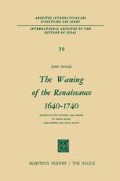Abstract
Since Norris’s reputation rests primarily on his Platonic idealism and Metaphysical poetry, it is necessary to establish to what extent he occupies a position on the threshold of the Enlightenment. If we take Browne’s “America and untravelled parts of truth,” and Glanvill’s “unknown Peru of Nature,” as an expressive indication of the spirit of the previous generation; 1 and if we take the age of Watts and Addison, with its self-conscious Enlightenment, as having passed the threshold; then it must appear that Norris is nearer to Watts than to Glanvill. The age of Browne and Glanvill was an age of exploratory enthusiasm and insatiable curiosity. These qualities faded as men realised they were rid of the cobwebs of the Schools and no longer haunted by the ghost of the Stagirite. When Watts rescued one last science — logic — from the disrepute it had lain in since Bacon had begun the great assault on Aristotle, his self-congratulatory dedication to “so polite and knowing an age” was already a cliché.2 Norris is also conscious of living in an enlightened age, but he appears to be less comfortable and less complacent about it. This sense of being in the Enlightenment, but not quite of it, can be pin-pointed at the beginning and at the end of his literary career.
Access this chapter
Tax calculation will be finalised at checkout
Purchases are for personal use only
Preview
Unable to display preview. Download preview PDF.
References
Sir Thomas Browne, Pseudodoxia Epidemica (1646), and Joseph Glanvill, The Vanity of Dogmatizing (1661), as quoted in Willey, 17th Century Background, p. 48.
Isaac Watts, Logic, Or the Right Use of Reason in the Inquiry after Truth, Dedication, in Works, ed. D. Jennings and P. Doddridge (6 vols.; London, 1753 ), V, iii.
John Norris, “Sermon preached in Bath, 30 July,” in Reflections upon the Conduct of Human Life, with reference to the Study of Learning and Knowledge. In a Letter to the Lady Masham (2nd ed.; London: S. Manship. 1691), p. 213.
John Norris, The Theory and Regulation of Love. In Two Parts. To which are added Letters Philosophical and Moral between the Author and Dr H. More (2nd cd.; London: S. Manship, 1694), “To the Reader,” and p. 2.
John Norris, Two Treatises Concerning the Divine Light. The first being an Answer to a Letter of a Learned Quaker. The second being a Discourse Concerning the Crossness of the Quakers’ Notion of the Light Within (London: S. Manship, 1692), I, 27.
Edmund Burke, Reflections on the French Revolution ( London: J. M. Dent, 1910 ), p. 84.
Rights and permissions
Copyright information
© 1971 Martinus Nijhoff, The Hague, Netherlands
About this chapter
Cite this chapter
Hoyles, J. (1971). Norris and the Enlightenment. In: The Waning of the Renaissance 1640–1740. International Archives of the History of Ideas/ Archives internationales d’histoire des ideés, vol 39. Springer, Dordrecht. https://doi.org/10.1007/978-94-010-3008-3_7
Download citation
DOI: https://doi.org/10.1007/978-94-010-3008-3_7
Publisher Name: Springer, Dordrecht
Print ISBN: 978-94-010-3010-6
Online ISBN: 978-94-010-3008-3
eBook Packages: Springer Book Archive

